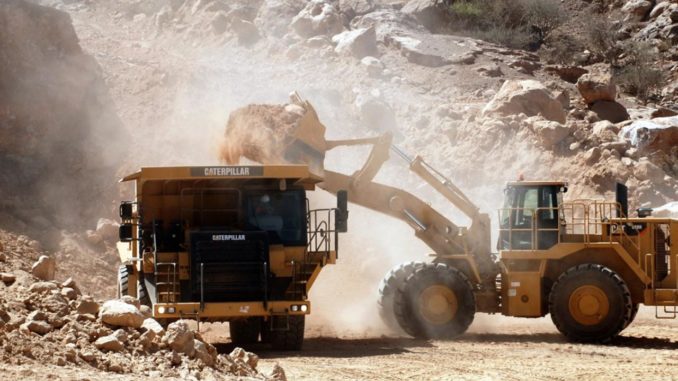
Mining sector in Nigeria has been plagued with a lot of challenges, which has negated the growth, limited the potentials and viability of the industry. Addressing these key challenges would unlock the sectors prospects.
Nigeria is endowed with a wealth of extractable solid mineral reserves across the 36 states of the federation and the FCT. Some of these minerals are coal, gold, lead-zinc, iron ore, uranium, limestone, gypsum, copper, marble, columbite, granite, clay, glass sand, gemstones, barite, tin, talc, bitumen, among others.
Despite the huge solid mineral deposits in the country, the solid mineral sector contributed a paltry 0.3% to the Gross Domestic Product (GDP) in 2017 according to data from National Bureau of Statistics (NBS), whereas it was reportedly around 4-5% in the 1960s. This decline was as a result of gross negligence of the sector over the years due to skewed interest towards oil and gas exploration/exploitation since its discovery and subsequent boom in the 1970s.
At a time when the country is battling economic woes, poverty and unemployment, unfettered attention should be given to the sector, as it amasses an enormous wealth of opportunities that could turn around the financial situation of the nation.
Consequently, calls had been made for the diversification of the nation’s economy and notwithstanding the quest by the current administration to revamp the solid mineral sector, it is still fraught with myriad of challenges. Therefore, problems bedeviling the sector should be given a front seat in order to actualise the great potentials the sector possess.
The vast majority of the extractable minerals in the country are largely untapped, hence, the below par operating capacity of the sector. The reason, I believe, circles around inadequate geological data, paucity of funds, preponderance of artisanal and illegal miners, poor infrastructure, insecurity in the country, among others.
Before multinational mining companies would consider investing in the solid mineral sector, ore bodies of economic viability in specified locations have to be identified. Geological and geophysical data on solid minerals in the nation is grossly inadequate and government agencies such as Nigerian Geological Survey Agency (NGSA), among others, charged with the responsibility of generating these data are not properly equipped to execute their statutory obligations.
Therefore, the nation needs to undertake extensive airborne photo-geologicaland electromagnetic surveys in order to evaluate and update its geological database. Accurate geoscientific data for solid minerals when generatedshould be clearly documented and made accessibleto stakeholders and prospective investors. Mineral exploration, which is prerequisite to engaging exploitative activities in the sector is capital intensive and most local private investors lack the financial capacity. The sector has been battling with infrastructural associated problems ranging from lack of proper transportation channels, epileptic power supply, and unavailability to shortage of sophisticated machineries needed for modern day mining activities. Hence, the use of crude implements such as axe, hammer, shovel and wheel barrow as witnessed among artisanal miners across the country.
More so, owing to overwhelming number of these small-scale miners, the volume of production for these minerals had remained low and cannot meet the demand of industries. These gross deficiencies have left the sector at the mercy of foreigners whom after huge investments, tend to flay and circumvent local mining laws guiding the sector in a bid to generate monster profit. This flagrant disposition by some of these investors had led to the neglect of subsisting environmental laws, resulting to incidences where indigenes and host communities bemoan hazardous effects of their mining activities.
Panacea I believe should be financial empowerment in form of grants and loans made available to local investors at the stage of exploration, development and early stages of mining. This they would pay back when the moneybag is unearthed. The government should provide infrastructures such as motorable roads, rail-lines and stable electricity supply. Environmental impact assessment surveys should be enforced on mining companies and supervisory ministries should scrutinise reports. This is to detect and forestall the occurrence of unforeseen hazards.
Policy somersault resulting from political uncertainties in the country is also a quagmire. Successive governments tend to truncate ongoing projects and initiatives started by previous government. Hence, there is a need to set up an inclusive legal, fiscal, regulatory and operational framework/policy that internalises the activities of both formal and informal operators in the sector in order to incentivise and build its capacity. Non-continuity of projects tends to limit seamless growth of the sector and should be avoided.
Given the high number of expatriates abducted in certain localities with massive ore reserves, investors are sometimes dissuaded from commencing exploration/exploitation activities in those areas. Engagement of private security apparatus by firms has since become a necessity at increased cost.
Government and local authorities, therefore, have to be proactive in tackling this menace in order to attract sustainable investments that would in time transform their communities.
Maduabueke, a graduate in Geology and Mining, wrote from Lagos.
END

Be the first to comment